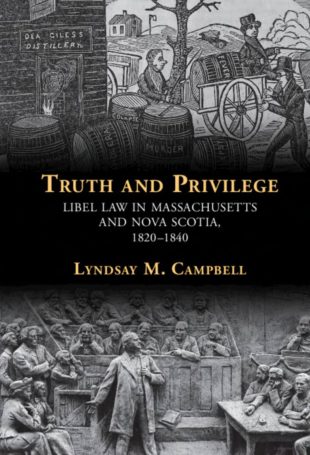By Professor Lyndsay Campbell of the University of Calgary. Published by Cambridge University Press, and a joint publication in the Osgoode Society Series and the American Society for Legal History’ Studies in Legal History Series.
Truth and Privilege is a comparative study of the interplay among legal and constitutional traditions, political and religious controversy, publishing practices, institutional logic and personalities that drove the evolution of the body of law used for disciplining wayward presses and tongues in Nova Scotia and Massachusetts in the 1820s and 1830s, as these two deeply connected places worked through the implications of responsive democratic governance. Both places prized both good character and free expression, but courtrooms were far more often the site of these conflicts in Massachusetts. Campbell’s research on the defences of truth and privilege demonstrates the similarities and differences between these places in how the tensions around assertions of legislative power and claims to individual conscience and expression played out. She explores the unfolding of legal and popular thought on acceptable justifications for publishing objectionable expression and the incentives institutions offered to draw participants, including women, into court or to keep them out.

